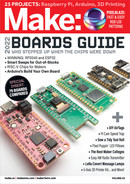
FEATURES California Kit Makers
#2
KitCo, est. 2019
A Modular Canvas
for Projects By Nancy Otero
KitCo brings project-based learning into homes
and classrooms through “challenges” linked
to unique ideas that are worth learning. Our
starting point is a cardboard kit that invites even
technology-skeptical teachers and students to
create projects. Once they feel like it, they can add
textiles, paint, robotics, augmented reality (AR), or
artificial intelligence (AI).
I love technology; I was a software engineer in
my previous life, but my passion has always been
learning, so I’ve been dedicated to education in
the last decade. I have worked with educators
from China, Brazil, Mexico, the United States,
and Spain. I created professional development
programs that trained hundreds of teachers
in New York City, and built Fab Labs and
makerspaces in all five boroughs. I co-founded a
nonprofit in Mexico that implemented innovation
labs with underserved high schoolers while
researching their experiences with Stanford
University. I was the founding director of learning
at Portfolio School, director of learning at Make:,
and a fellow at OpenAI.
When the Covid crisis started, I was worried
about children having so much screen time and
not enough opportunities to externalize what was
happening in their world. So I began KitCo, to
support schools in implementing remote project-
based learning, a type of learning that could give
children agency — something so needed when
we were all witnessing the world change without
our say.
The design had a few constraints: I wanted to
create something comfortable that didn’t scare
anyone, not a STEM kit, but a modular canvas
for projects. It had to be cheap, able to mix with
recyclable materials, and able to grow into
robotics or AR.
For a long time, it was me, a laser cutter, and
many cutoffs of cardboard boxes. I dived into
pieces I designed for old workshops, analyzed
other kits, and conducted mini tests with friends
and family. The real learning was the first time I
implemented it in an elementary school, where
I observed teachers and helped more than 300
children play and create with the kit.
Our cardboard kit is compatible with the
most common motors and servos used for
Arduino, micro:bit, and GoGo Board. The holes
in our design are great for wooden sticks or
pipe cleaners, and we have wooden pulleys
that give projects smooth movement. We have
pieces made for structural support, others
for storytelling and wearables, and a set for
mechanical functions.
After the first year, we were happy and
astounded by all the different projects children
created for our challenges. For our Defy Gravity
challenge, a team of second-grade girls from
Sunnybrae Elementary School created a solar
system with robotics. For the same challenge,
a kindergarten made a wearable that launched
a ball through a lever mechanism. Today our
subscription model includes a magazine that
showcases some of those ingenious solutions
children send us.
Next month we’ll be launching Hands and
Dots, a series of experiences co-designed with
extraordinary educators who understand how to
operate in underserved and complex contexts.
32 makezine.com
KitCo, Learn to Solder Kits
M83_030-33_CaliforniaKits_F1.indd 32M83_030-33_CaliforniaKits_F1.indd 32 10/10/22 12:37 PM10/10/22 12:37 PM
..................Content has been hidden....................
You can't read the all page of ebook, please click here login for view all page.
